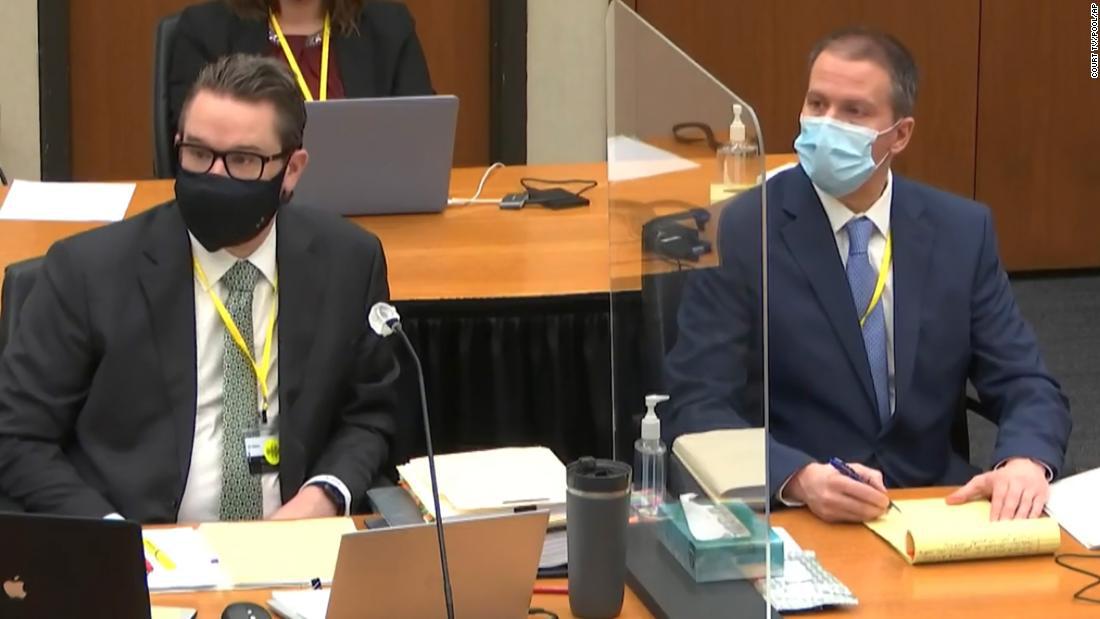Witness to Floyd's arrest: A man was being killed 4:02
Editor's Note:
Dr. Judy Melinek is an American forensic pathologist and president of PathologyExpert Inc. She is currently working as a pathologist in Wellington, New Zealand.
She is the co-author, along with her husband, the writer TJ Mitchell, of the memoirs "Working Stiff: Two Years, 262 Bodies, and the Making of a Medical Examiner," and of two novels in the forensic detective series Jessie Teska.
You can follow her on Twitter @drjudymelinek.
The opinions expressed in this comment are yours.
See more opinion articles on CNN en Español.
(CNN) -
I make a living performing autopsies on people who have died suddenly, violently, or unexpectedly.
I often testify in criminal and civil cases, where I explain medical terminology to juries.
The medical evidence in George Floyd's death is complex, and is likely key to Derek Chauvin, the ex-cop accused of killing Floyd, from being convicted.
The Hennepin County Medical Examiner determined that a combination of injuries, natural diseases and drugs were responsible for his death.
Some of these findings, individually, could have caused his death, and yet in this case they seem to have worked together.
Many of the terms used by expert witnesses, doctors, emergency medical personnel, and attorneys in Chauvin's trial are complicated or unfamiliar to the public.
Understanding them can be crucial to following the process.
Important terms for Chauvin's verdict
Hypoxia or anoxia.
These terms, respectively, describe the lack or absence of oxygen reaching the brain or other organs.
The prosecution has asked witnesses if Floyd died because of insufficient oxygen to his brain.
They are likely to argue that Chauvin killed Floyd by putting his knee to his neck.
This cuts off the flow of blood, and therefore oxygen, to the brain.
The defense will likely argue that the main cause of Floyd's hypoxia was not Chauvin's knee, but Floyd's heart disease, exacerbated by a fentanyl overdose.
Respiratory depression
Opioid drugs, such as fentanyl, cause the brain to slow down breathing, which is also known as respiratory depression.
The likely defense case is that the fentanyl found in Floyd's system caused his breathing to slow down so much that it killed him.
Agitated delirium
.
This is a syndrome that can be caused by stimulant drugs such as methamphetamine, or by mental illness, or by both.
Methamphetamine, which was found in Floyd's blood, can induce a dangerous rise in body temperature (hyperthermia) and an agitated state that causes acid to build up in the blood (acidosis), causing a fatal heart rate.
One of the police officers who restrained Floyd mentioned that he was concerned about the
agitated
delirium
.
But patients with this syndrome are often sweaty, hallucinating, violent, or act strange, such as undressing.
Neither of those symptoms applied to Floyd, as witnesses corroborated.
LEE: Independent autopsy says George Floyd's death was a homicide due to & # 8216; sustained pressure suffocation & # 8217;
Suffocation.
From a Greek word meaning "pulseless," suffocation occurs when there is an obstruction to the flow of air or blood.
Neck compression can cause suffocation by obstructing the windpipe or stopping blood flow to or from the brain.
Compression of the chest and body can contribute to suffocation by preventing the chest from expanding and by slowing cardiac return, the flow of blood back from the body to the heart.
The medical examiner's report and the prosecution say that the main cause of Floyd's suffocation appears to be Chauvin's neck compression, as seen in the bystanders video, although the other officers who put pressure on his chest and limbs Floyd's may also have contributed.
Cardiorespiratory arrest.
This simply means that the heart and breathing have stopped.
It does not specify why.
The medical examiner's report indicates that Floyd's heart and lungs stopped working when he was subdued and restrained.
Exactly how this happened will be a source of questions for both parties.
The defense will try to argue that Floyd's heart was enlarged due to high blood pressure and had severe narrowing of his arteries, and that those conditions caused cardiorespiratory arrest.
Stop by PEA.
Pulseless electrical activity (PEA) occurs when the heart has stopped beating (so the pulse cannot be felt), but there is still some electrical activity in the heart's conduction system.
This activity can be detected on an electrocardiogram.
This type of cardiac arrest occurs most often in people who have stopped breathing first, causing a lack of oxygen that prevents the heart from beating properly.
A heart in PEA cannot be resuscitated with a defibrillator, and the PEA may end in asystole, that is, with a flat line on the EKG.
READ: Former police officer Derek Chauvin knelt over George Floyd 9 minutes and 29 seconds, more than the infamous 8:46
Carbon dioxide.
This molecule increases in the blood when you stop breathing.
The defense uses the high level of carbon dioxide in Floyd's blood as an indicator that an overdose of fentanyl had prevented him from breathing properly.
The prosecution sees it as an indicator of suffocation due to police restraint.
But this blood gas value may simply be high because Floyd had not been breathing for quite some time at the time the blood was drawn at the hospital.
Atherosclerotic or arteriosclerotic cardiovascular disease.
Narrowing of the arteries from high blood pressure and cholesterol.
Several of the arteries feeding Floyd's heart were significantly narrowed.
This restricts blood flow and can lead to cardiac arrest called ventricular tachycardia or fibrillation.
These are "shockable" rhythms, and not what the paramedics said they found on his EKG.
This may be one of the reasons why Floyd's heart disease was not considered the leading cause of death by the medical examiner.
George Floyd Trial











